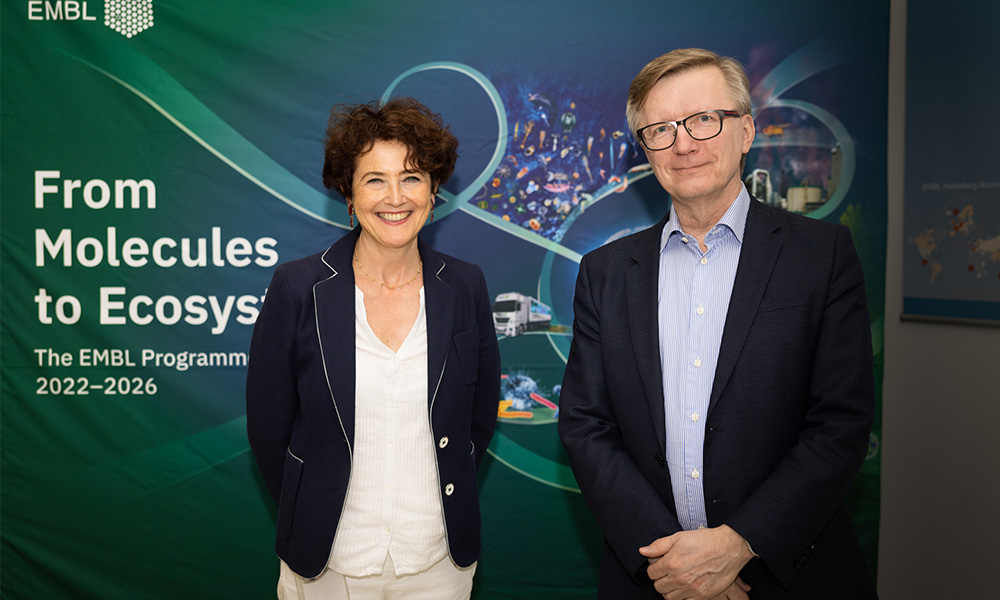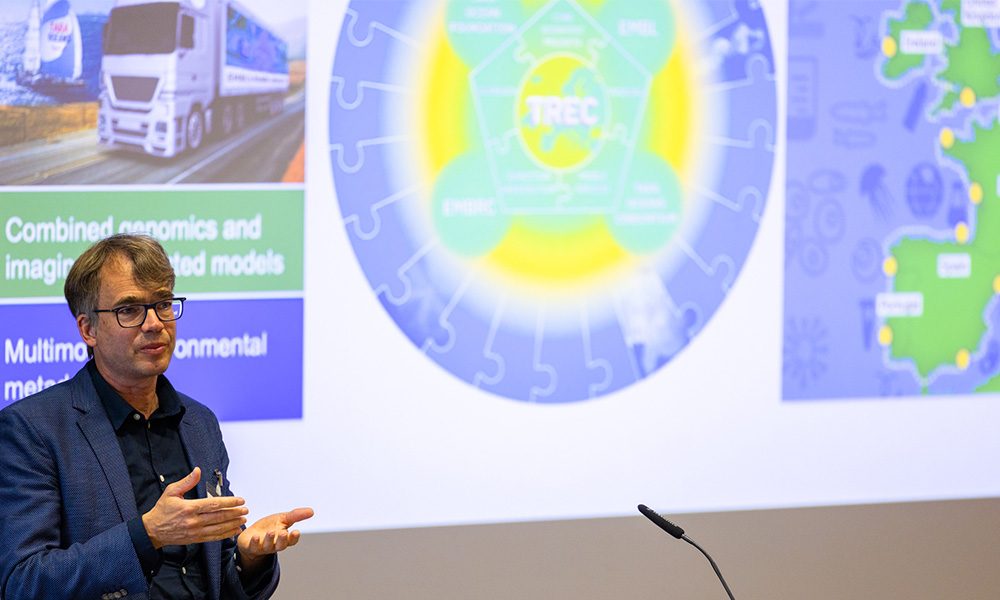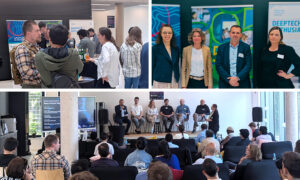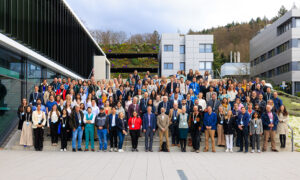
EMBL and SciLifeLab foster new connections
Joint workshop brings researchers together on site and virtually to discuss broad range of planetary biology topics.

One of EMBL’s core missions is the coordination and integration of European life sciences. While the pandemic dealt a blow to many physical gatherings, the Heidelberg site is now once again buzzing with international visitors.
On Monday and Tuesday, more than 60 participants gathered for a joint workshop between EMBL and the Swedish Science for Life Laboratory (SciLifeLab). Sessions covered a broad range of topics including data-driven planetary biology, biodiversity genomics, ecology, and evolution.
“Following the very stimulating virtual kick-off event last year, this in-person workshop provides a great opportunity for our researchers to exchange ideas and identify areas for further collaboration,” said EMBL Director General Edith Heard. “We have much to discuss and plan together, so it’s great to be able to meet up face-to-face, and we are thrilled to be able to host the SciLifeLab delegation on site.”
Shared aims
SciLifeLab is an institution for the advancement of molecular biosciences in Sweden. It came into existence thanks to the combined efforts of Stockholm University, Karolinska Institutet, KTH Royal Institute of Technology, and Uppsala University. EMBL and SciLifeLab share a large number of research interests and long-term goals, including striving to advance life sciences for the benefit of healthcare, biodiversity, and the environment.
The workshop gave a taste of the many opportunities created by the signing of a memorandum of understanding between SciLifeLab and EMBL last year. The MoU has at its heart a commitment to working together, across national borders and scientific disciplines, in order to align research interests and long-term goals for the benefit of some of our planet’s most pressing challenges.
SciLifeLab Director Olli Kallioniemi expressed his wish to ignite new collaborations around planetary biology, stating, “Global challenges must be met with global research efforts, and this workshop provides the soil for seeds of such research to be planted in. This is hopefully just one example of thematic joint symposia and events that we hope to run together with EMBL.”
Coming together to tackle global challenges
By joining forces through events like this, EMBL can help increase opportunities for scientific collaborations between those with deep expertise. One such participant was Anna Rosling, a group leader at Uppsala University. In her presentation, Rosling spoke about the great importance of understanding how soils function, and her talk encapsulated the aims of this workshop and the broader EMBL-SciLifeLab collaboration, which is predicated on the importance of bringing scientists together to find solutions to improve planetary and human health.
“Understanding and protecting soil diversity is critical for maintaining healthy and productive soils needed for food, fuel and fibre production,” Rosling explained. “Soils are interesting complex systems shaped by geology, chemistry, climate, biology and human activities, and methodological and statistical development has brought the scientific community to a spot now that we can study soil in their full complexity. Workshops like this one is a chance to do just that, bringing different scientists together to take on big and complex topics and make use of the incredible technological and conceptual development that these communities have built.”
A bright future for collaboration

Credit: Kinga Lubowiecka/EMBL
The workshop’s focus on planetary biology ties in to EMBL’s 2022-26 Programme ‘Molecules to Ecosystems’. Under this transversal theme, EMBL is combining direct investigation of planetary ecosystems through field studies with controlled laboratory research on experimental model systems. EMBL Group Leader and Senior Scientist Detlev Arendt, who is the co-chair of the Planetary Biology transversal theme, said “ It is, in many ways, a completely revolutionary way to think about molecular biology and how it can help us understand our planet and the challenges it is currently facing. What’s more, we are envisioning using molecular biology approaches to devise potential solutions to some of the huge environmental issues of today, which is one of the most exciting ideas we have ever come across.” More information on specific areas within the Planetary Biology theme can be found on the EMBL website.
As for this workshop and the relationship between EMBL and SciLifeLab, Kallioniemi is clear that there is much more to come. “We see many opportunities for collaboration ranging from research infrastructure and technology and data-driven research concepts to specific research areas, of which planetary biology is the first one that was singled out. Basic research to meet global challenges is always dependent on large-scale collaborations. I see the memorandum of understanding signed between EMBL and SciLifeLab last year as a door-opener for even more collaborative research.”


